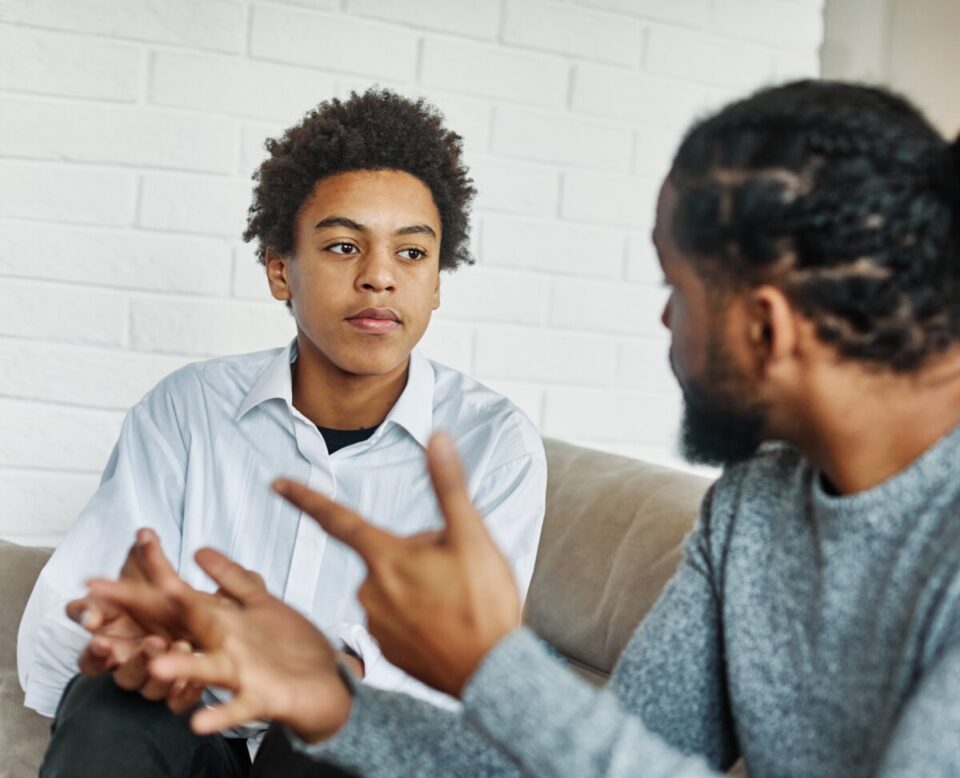It Happens to Them and Their Families, Too
Homepage photo: The parental “Talk” with young Black people about behavior toward police was frequently referenced. (Credit: Shutterstock)
Journal-isms Roundtable photos (c) by Sharon Farmer/sfphotoworks
Support Journal-ismsDonations are tax-deductible.
Trevor Noah explains in this 2021 episode of “The Daily Show” that because Black people are disproportionately targeted by police, many parents are forced to have “The Talk” with their young children about how to best navigate this reality. (Credit: YouTube)
It Happens to Them and Their Families, Too
The conversation took Michael Days (pictured, below), a former editor at the Philadelphia Inquirer and Daily News, “back to when we were living in Princeton. I don’t know, 40, 40 years ago maybe.
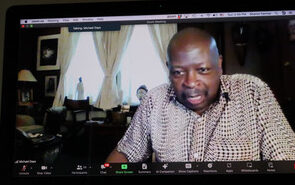 “And we had one car and a little Volkswagen Rabbit. And I was working — we moved to Princeton [N.J.] largely because I was working in Philly.”
“And we had one car and a little Volkswagen Rabbit. And I was working — we moved to Princeton [N.J.] largely because I was working in Philly.”
Days’ wife, Angela P. Dodson, “was working in New York at the Times and people said, ‘Oh, you should probably live in Princeton.’
“Well, living in Princeton was a bit of a nightmare for a Black man trying to pick up his wife at 1:30-2 o’clock in the morning at the Princeton Junction, Princeton, train station.
“And some of y’all on this call appear to be old enough to remember when we did not have cell phones.
“And so, there I am living . . . in a town where everybody had sort of high-end cars and we did not. . . .
“So one evening, this cop pulls me over.
“And it wasn’t the first time I was pulled over, because I was traveling in all kinds of hours.
“He says, ‘you stole this car’. That’s an officer. And you know, I always tried to use wit, a bit of humor to try to keep myself alive.
“I said, ‘Officer, this is Princeton, N.J. Who steals a Rabbit in Princeton? And he looked at me, I said, ‘Well, my wife is at the train station.
” ‘And she’s there alone. You see what time it is. You can do with me what you want, but let me, would you please follow me to the train station? So she can take the car and then you can do what you want with me.’
“So he does follow me to the train station. That’s gotta be five, seven miles.”
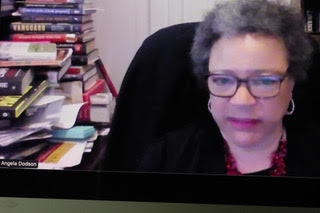 “Which is out of his jurisdiction,” Dodson (pictured) interjected.
“Which is out of his jurisdiction,” Dodson (pictured) interjected.
“Yeah, that’s a good point. Out of his jurisdiction,” Days replied. “Thank you. Angela gets in the car and he just takes off.
“And that wasn’t the first time that happened, but that was about the time where we decided we need to move someplace else.”
Compared with other stories about Black men and police, Days’ story is relatively benign, what might be called a microaggression.
By contrast, The Washington Post is running a series, “Abused by the Badge,” that says, a Post “investigation has found that hundreds of police officers in the United States have sexually abused children while officials at every level of the criminal justice system have failed to protect kids, punish abusers and prevent additional crimes.”
And on Thursday, the Justice Department released a 126-page report saying that the “Phoenix Police Department systematically used unlawful force, disproportionately targeted people of color and routinely violated the rights of protesters, unhoused people and others having mental health crises,” in the words of the Arizona Republic.
Meanwhile, the Associated Press, along with “Frontline,” is promoting its own investigation that found, “Over a decade, more than 1,000 people died after police subdued them through physical holds, stun guns, body blows and other means not intended to be lethal. . . . In hundreds of cases, officers weren’t taught or didn’t follow best safety practices for this force, creating a recipe for death.”
The targets of police abuse are not all men — or men of color — but Black women, mostly journalists, have put forth their responses to it in a new book edited by Dodson, “We Refuse to Be Silent: Women’s Voices on Justice for Black Men.”
Contributors spoke at a Journal-isms Roundtable June 2. Forty-five people attended the Zoom session, and 74 had watched on YouTube as of June 15. You can watch the embedded version above or on the YouTube site.
The writers provided takeaways that included:
- The trauma induced by such encounters can be long-lasting, affecting not only the Black male victim, but his family. “Law enforcement encounters for Black Americans stretch beyond the streets of our cities and into Black Americans’ homes, where they have a negative effect on family life,” as Deadric T. Williams, a sociologist, and Armon Perry, a professor of social work, have written.
- Despite entreaties from journalism style guardians, media outlets that publish only the law-enforcement side of the story continue to be a problem. The one-sidedness comes despite urgings from the Associated Press Stylebook to be “cautious about initial news releases or statements from law enforcement or other officials. Accounts by police, especially in the hours just after a crime, are very incomplete and can be inaccurate.”
- The long-term effects on the journalists themselves covering these stories should not be underestimated. The words used most often to describe the Roundtable conversation were “powerful” and “triggering.” Unpleasant or traumatizing memories resurfaced.
- The disproportionate harm to disabled people by police surprised many. A March 2016 report from the Ruderman Family Foundation said, “up to half of all people killed by police in the United States are disabled and . . . almost all well- known cases of police brutality involve a person with a disability.”
In a July 2020 article, “Police Violence Against Black Disabled People Can’t Be Ignored Anymore,” Britney Wilson, a Black disabled civil-rights attorney, told HuffPost, “Both people of color and people with disabilities are more likely to come in contact with law enforcement. And both groups have higher chances of negative things happening as a result.”
Dodson, who has her own chapter on this issue in the book, said later, “People are often unaware of the dangers because news coverage of these cases often fails to mention that the person had a disability — physical, intellectual, or mental.
“Prominent victims of police brutality like Sandra Bland [epilepsy], Freddie Gray [asthma], Eric Garner [asthma], Elijah McClain [anemia], and Tanisha Anderson [heart disease and mental illness] all had disabilities or underlying health issues that may have played significant roles in their deaths — yet these aspects of their identities tend to get glossed over.”
Did those who joined Dodson come with stories!
A few:
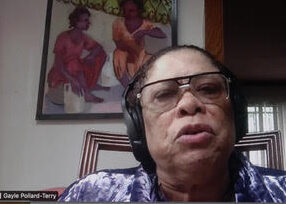 Gayle Pollard Terry (pictured), retired editorial writer at the Los Angeles Times, recounted how, during the 1991 police beating of Rodney King, she worked to humanize King, and, using her community contacts, found and interviewed his daughter.
Gayle Pollard Terry (pictured), retired editorial writer at the Los Angeles Times, recounted how, during the 1991 police beating of Rodney King, she worked to humanize King, and, using her community contacts, found and interviewed his daughter.
“It took a while, but finally when we did talk I was really struck by the fact that she was a little girl, 7, when she saw the beating on TV with her sister.
“And they had no idea that this was their father. And then I was struck that she was going to 54th Street Elementary in South Central.
“And her last name was King and kids would tease her: Oh, your daddy got beat down, blah, blah, blah, blah, blah.
“And, she told me how her father got permission from the . . . principal to come to the school and he would play softball with the kids and he would bring them . . . snacks.
“And that he was a very involved father. And she made the point that, ‘How do you think a child feels?’ “
Sonya Ross, a veteran journalist who is now managing editor of Inside Climate News, wrote about and discussed her cousin, actor Ray Vitte.
“The police responded to his apartment on a noise complaint in 1983. . . .
“The neighbors had said it was noisy and the conversation with the cops escalated and the result was that my cousin was loaded into the back of the car by the LAPD and taken away allegedly for psychiatric evaluation, and when they arrived at the station house with him or [at] the hospital, we’re not sure, he was dead in the back of the car.
“And there’s just so many questions around this. And how do you live with the questions and what are the myriad ways that the questions just sort of nag at you and eat away at you for generations? Actually, because of Angela’s book and this essay, my family is having conversations again about Ray. . . .” An aunt in her 90s still, today, rues telling Vitte to stay in Los Angeles.
“I do hope that everyone who reads this book comes away from reading it with a plan of action on some aspect of this,” Ross said. “Finding some way to do something personally themselves to try to make a difference for our men. . . .”
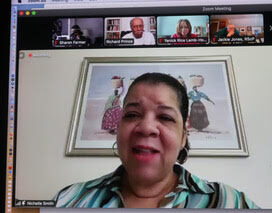 Nichelle Smith (pictured), formerly enterprise editor for racism and history at USA Today, said that after the George Floyd murder in 2020, “as the only black female investigative editor on their team. I didn’t really take kindly to jokes about chokeholds and pinch holds.”
Nichelle Smith (pictured), formerly enterprise editor for racism and history at USA Today, said that after the George Floyd murder in 2020, “as the only black female investigative editor on their team. I didn’t really take kindly to jokes about chokeholds and pinch holds.”
Smith discussed a session she organized at USA Today a few months after the March 13, 2020, death of Breonna Taylor in Louisville, Ky. She invited some community people to join the Zoom.
“We had an amazingly profound hour-and-a-half session, Zoom call for the entire company, where we discussed the media not talking to the family, the media taking points of view of the police for granted, the media not humanizing people.
“And my colleagues were at first defensive about this. Told me that their inclination was to push back and say, ‘Look at all we’ve done to cover . . . . death by cop adequately.’ But then they really began to listen as these women tell their stories. So I can sum up by saying [hold] some sort of forum like that, get Black women together, get Black men together in the newsrooms and I didn’t ask anybody’s permission; I just proceeded until apprehended and then people were like, ‘Well what are you doing?
” ‘We want to get in on this.’ So grab your groups and make the most of the power that you can have . . . in the newsroom to talk about these issues.
“We did affect coverage. We were able to humanize her. . . .”
Contributor Ingrid Sturgis mentioned the Dart Center for Journalism and Trauma at Columbia University as a resource. She is department chair of the Department of Media, Journalism, Film & Communication in the Cathy Hughes School of Communications at Howard University. Sturgis wrote about the police practice of “stop and frisk.“
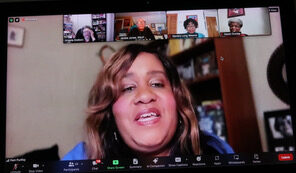 Pamela Purifoy (pictured), a brand strategist, noted that the National Association of Black Journalists recently created a Wellness Task Force that meets monthly, discussing topics that include mental health. NABJ members are free to join in.
Pamela Purifoy (pictured), a brand strategist, noted that the National Association of Black Journalists recently created a Wellness Task Force that meets monthly, discussing topics that include mental health. NABJ members are free to join in.
The overall subject resonated.
I “would love to see this topic as a panel for upcoming journalism conferences,” Sheila Solomon, a veteran journalist who is vice chairman of the board of directors at Journalism Funding Partners in Chicago, wrote in the chat box.
Days said afterward, “It was obvious that this has been an issue for a long time, and people wanted to have a way of talking about this.”
Dodson added, “The book gives us a way to dissect the issues and draw out the data and examine specific incidents and how all this impacts Black men, the women who love them, and the community at large.
“I loved that the contributors got to discuss their individual essays and interact. Some of them have never been in conversation with one another. I think most of them didn’t necessarily know who else was in the book. (I still don’t know some of the women we bought permissions from.) I liked that we could focus on how this impacts journalists and what journalists must do. At NABJ, we will have about a dozen contributors on the Authors Showcase.
“We will also be taking this to JAWS in September,” she said, referring to the Journalism and Women Symposium.
“Frontline,” the Associated Press and the Howard Center for Investigative Journalism investigate deaths that occurred after police used such tactics as prone restraint and other “less-lethal force.” (Credit: YouTube)
The last word should go to the Associated Press Stylebook:
“Criminal justice reporting and writing also requires a commitment to fairness by always giving a person accused of a crime the opportunity to comment, following up on crime stories throughout the justice system, and highlighting instances in which a person’s name has been cleared.
“It requires cultivating a diversity of sources and always working to verify information provided by law enforcement or other authorities.
“And often it calls for accountability journalism: looking for warning signs that might have been missed; law enforcement response; weapon issues; what might be done to prevent similar crimes in the future.
“A fundamental principle of the criminal justice system is that all people accused of crimes are presumed to be innocent until they have been proven guilty in court. That principle should also be central to newsrooms’ coverage of crime and courts, in line with key journalistic principles of balance and accuracy.
“When considering whether to write about an arrest or criminal charges, ask yourself: Will I follow this case until the end? If not, you may not know if the charges are later dropped or if the suspect was acquitted. If it is a minor crime and you are unlikely to follow up with coverage about the outcome of the case, consider not naming the suspect in the story or not writing about the case at all.
“It also is essential when writing about someone charged with a crime to get a response from the accused person, their attorney, a family member or another representative. If sufficient efforts are made to speak to a representative for the defendant and no one is available or they decline to comment, we must highlight in stories the efforts taken to reflect the point of view of the person who is accused. This must be done even when covering a defendant’s guilty plea or conviction. It is not about checking a box but about upholding our commitment to fairness. . . .”
- Mary C. Curtis with Angela P. Dodson and Lottie Joiner, Roll Call: Women’s Voices on Justice for Black Men (podcast) (May 29)
- Shauna Cooper, UNC Research, University of North Carolina: Black Families Use “The Talk” to Help Their Children Cope with Racism (July 21, 2020)
- Julia Jacobs, New York Times: Four Tops Singer Sues Hospital Over Being Put in Restraints (about a hospital, not police)
- Anne McGlynn-Wright, Robert D Crutchfield, Martie L Skinner, Kevin P Haggerty, National Library of Medicine: The Usual, Racialized, Suspects: The Consequence of Police Contacts with Black and White Youth on Adult Arrest (2020)
- Mental Daily: Study Finds Black Men Are Most Likely To Be Reported Killed By Off-Duty Police (June 10, 2023)
Letter to the Editor
To the Editor:
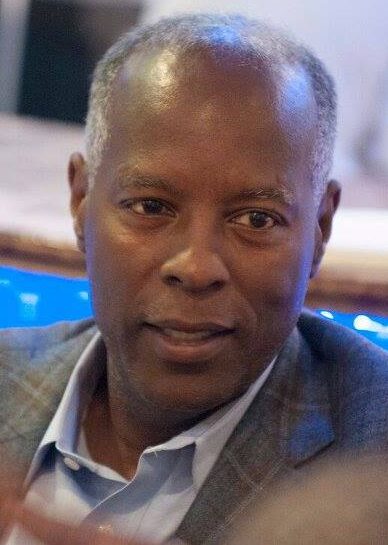 I think there is an over-reliance on compliance and obsequiousness in encounters with police.
I think there is an over-reliance on compliance and obsequiousness in encounters with police.
I tell my sons to know their rights during stops. They don’t need to be aggressive about it, but I think being informed about your rights is just as important, if not more important that being obsequious. For instance, if asked to exit the vehicle, I tell my sons to lock their car and tell the police they “will need a warrant to search my car,” as it
clearly establishes your lack of consent.
I also tell them to ask if they are being detained early on during an encounter with police. And if they are told “no,” to
tell the police they are on their way home. Otherwise, shut up and ask to call your parents or your lawyer.
This is a calculation I make under the assumption that my sons run a far higher risk of being unlawfully detained and charged with some BS than they do being injured or shot dead in the street by police. I also base this on the assumption that police (or law enforcement generally) do not mess with folks they think they will suffer repercussions from. So if you establish early on that you are somebody and know your rights, they are less likely to fuck with you. You just can’t be aggressive about it and embarrass them or make them look bad.
I generally think it’s a bad idea to offer explanations for anything during a traffic stop such as Michael Days saying “Well, my wife is at the train station.” What if she’s not there? The statement then raises questions about your veracity.
That’s my two cents.
Jube Shiver Jr.
President, Shiver Management Group
Alexandria, Va. www.smgroup.biz
Jube Shiver Jr. is a former journalist.
(Photo credit: George Tolbert IV, March 2017)
To subscribe at no cost, please send an email to journal-isms+subscribe@groups.io and say who you are.
Facebook users: “Like” “Richard Prince’s Journal-isms” on Facebook.
Follow Richard Prince on Twitter @princeeditor
Richard Prince’s Journal-isms originates from Washington. It began in print before most of us knew what the internet was, and it would like to be referred to as a “column.” Any views expressed in the column are those of the person or organization quoted and not those of any other entity. Send tips, comments and concerns to Richard Prince at journal-isms+owner@
View previous columns (after Feb. 13, 2016).
View previous columns (before Feb. 13, 2016)
- Diversity’s Greatest Hits, 2018 (Jan. 4, 2019)
- Book Notes: Is Taking a Knee Really All That? (Dec. 20, 2018)
- Book Notes: Challenging ’45’ and Proudly Telling the Story (Dec. 18, 2018)
- Book Notes: Get Down With the Legends! (Dec. 11, 2018)
- Journalist Richard Prince w/Joe Madison (Sirius XM, April 18, 2018) (podcast)
- Richard Prince (journalist) (Wikipedia entry)
- February 2018 Podcast: Richard “Dick” Prince on the need for newsroom diversity (Gabriel Greschler, Student Press Law Center, Feb. 26, 2018)
- An advocate for diversity in the media is still pressing for representation, (Courtland Milloy, Washington Post, Nov. 28, 2017)
- Morgan Global Journalism Review: Journal-isms Journeys On (Aug. 31, 2017)
- Journal-isms’ Richard Prince Wants Your Ideas (FishbowlDC, Feb. 26, 2016)
- Richard Prince with Charlayne Hunter-Gault, “PBS NewsHour,” “What stagnant diversity means for America’s newsrooms” (Dec. 15, 2015)
- Book Notes: Journalists Follow Their Passions
- Book Notes: Journalists Who Rocked Their World
- Book Notes: Hands Up! Read This!
- Book Notes: New Cosby Bio Looks Like a Best-Seller
- Journo-diversity advocate turns attention to Ezra Klein project (Erik Wemple, Washington Post, March 5, 2014)

